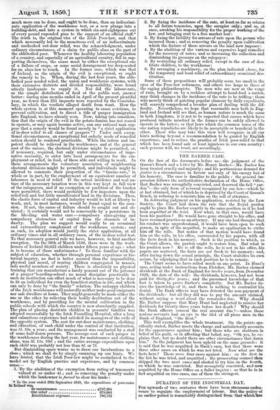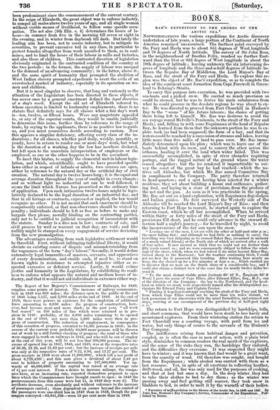DURATION OF THE INDUSTRIAL DAY.
Fox upwards of two centuries there have been strenuous endea- yours to regulate the employment of labour. But the policy of an earlier period is remarkably distinguished from that which has
been predominant since the commencement of the current century. In the reign of Elizabeth, the great object was to enforce industry, to compel all males above twelve years of age, and all single women without visible means of livelihood, to follow some specific occu- pation. The act also (5th Ella. c. 4) determines the hours of la- bour—in summer from five in the morning till seven or eight in the evening, and in winter from daybreak till dark. But lately the leading aim has been, not to coerce industry, but to mitigate its severities, to prevent excessive toil in any class, in particular to protect females altogether from work unsuited to them, as in coal- mines, and to limit the hours of their labour in mills and factories, and also those of children. This contrasted direction of legislation
obviously or ted in the contrasted condition of the country at the two periods: in the former, the supply of labour was unequal to the demand of an advancing community ; in the latter, above it; and the same spirit of humanity that prompted the abolition of West Indian slavery prompted expedients to avert the evils of an overstocked market of industry, especially in its operation on wo- men and children.
But it is most singular to observe, that long and variously as the attention of the Legislature has been directed to these objects, it has never once by a general enactment defined the legal duration of a day's work. Except the old act of Elizabeth referred to, whose operation is limited to husbandry employments, there is no statute that definitely says for all classes what a fair day's work is—ten, twelve, or fifteen hours. Were any magistrate appealed to, or any of the superior courts, they would be unable judicially to determine this issue, further than by reference to the usage of trade, by saying to the applicants, there is no positive law to guide us, and you must yourselves decide according to custom. Now this appears a singular deficiency, affecting every class of the in- dustrious; for all classes, whether paid daily, weekly, monthly, or yearly, have in return to render one or more days' work, but what is the duration of a working day the law has nowhere declared, but left open to the uncertain interpretation of employers or the employed, as one or the other happens to be in the ascendant. To meet this hiatus, to supply the elemental unit in labour legis- lation, and which, scientifieally, ought to have preceded specific laws either in respect of infants or adults, two courses are open, either by reference to the natural day or the artificial day of civil creation. The natural day is twelve hours long; it is the equal and average duration throughout the year of sunlight in every climate ; and as without light no industrial art can be well followed, it seems the limit which Nature has prescribed as the ordinary time of application. Upon such intimation twelve hours inight be legis- latively declared to be the legal duration of an industrial day, and that in all hirings or contracts, expressed or implied, the law would recognize no other. It is not meant that such enactment should be compulsorily enforced, or that non-observance should be visited by penalty ; individuals should be left as free as before to make any bargain they please, morally binding on the contracting parties, only not to be entitled to judicial recognition if inconsistent with the statute. Sunday is a dies non in law; contracts of sale, and civil process by writ or warrant on that day, are void ; and like nullity might be stamped on every engagement of service deviating from the new promulgation.
The advantages resulting from such legislative settlement would be threefold. First, without infringing individual liberty, it would obviate an existing source of dispute and misunderstanding from the vagueness of the term "day's labour." Secondly, it would define extensively legal immunities of masters, servants, and apprentices of every denomination, and enable each, if need be, to stand on known rights in resistance to attempted injustice either as re- spected excessive or deficient service. Lastly, it would evince justice and humanity in the Legislature, by establishing its readi- ness to enforce what appears the natural and medium hours of in- dustry, and that it would not aid individuals in extremes either way.



























 Previous page
Previous page